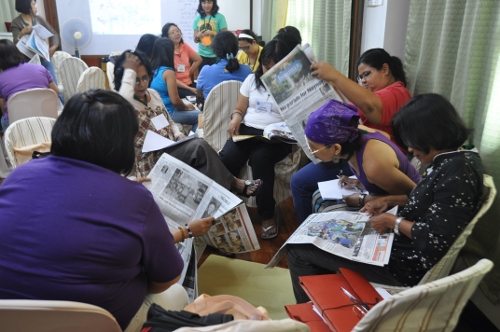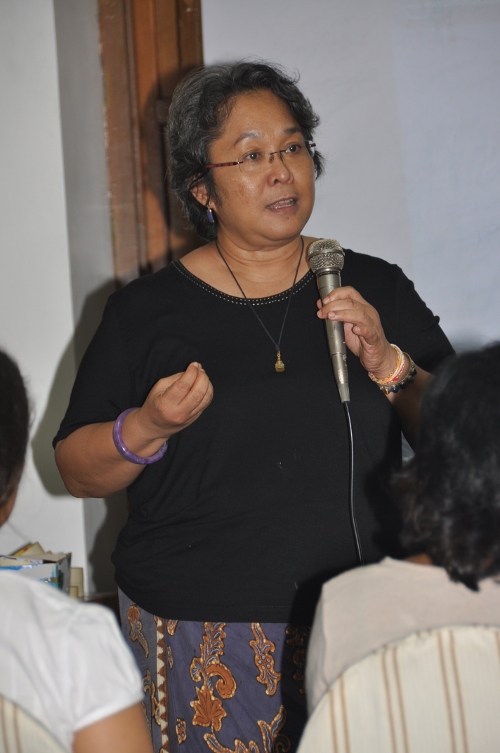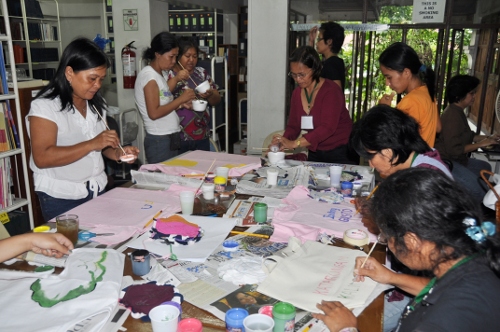By Sabrina Buzzalino, Isis International

This was the resounding call of participants who attended the recently concluded Isis Activist School on Engendering Climate Justice: The Southeast Asia Experience, in Manila, Philippines from 3-5 August 2010.
The Activist School on Engendering Climate Justice is part of a year long project where Isis endeavored to raise awareness on Southern women's experiences of the impact of climate change, its impact on women and its linkages to other gender issues. The project is aimed at surfacing southern women's perspectives and feminist analyses on climate change and the United Nations Framework Convention on Climate Change (UNFCCC), as well as strengthening feminist positions on gender and climate change in NGO-led processes.
Climate change is a reality faced by people and countries everywhere with women being the most affected due to their gender. However, women are also active agents in addressing immediate and strategic solutions to climate change. Through the recently concluded training, participants gained theoretical understanding of climate change from a feminist perspective, allowing them to appreciate the importance and necessity of integrating gender in interventions at the community, national, regional and international levels. The training also provided participants with practical skills on crafting effective messages on gender and climate justice, as well as on the use of various communication tools to help them strategies more effective advocacy campaigns.

Marion Cabrera, Coordinator of Isis International's Governance, Communications and Development (GCD) programme, emphasized the importance of making women's contributions and perspectives visible in climate change discussions at all levels.
“Isis believes that women's access and capacity to participate in generating and disseminating their own knowledge and experiences...can lead to the transformation of society,” she said.
Tito Soentoro, technical adviser of this project likewise shared information on the international climate change regime and its market-based foundations as well as strategies on engendering climate justice.
She emphasized, “Women already live in unjust situations as women. The climate situation multiplies those forms of injustices... So engendering the climate regime means to make [governments] aware that there is a gender construction in the society that left women behind in the decision-making.”
In addition, Soentoro highlighted the need for climate justice to be based on historical responsibility and a recognition of unequal power relations among nations.
For participants who came from varied backgrounds as farmers, urban poor community organizers, leaders of indigenous peoples development, gender officers for micro-credit organizations, the training was an enriching and educating experience because of the multiple perspectives and diverse experiences shared.
Babyluz Bador, the South Negros Team Leader for Negros Oriental Institute for Rural Development (NIRD, Inc.), stated, “The development work will not be successful if it is not gender sensitive.” NIRD, Inc. is a non-governmental organization working for sustainable development and democratization in Negros Oriental, Philippines.
Donna Switi Hardiani Hamidi, Leader of the Executive Community Body of Solidaritas Perempuan Aceh (Women Solidarity Aceh) in Indonesia shared, “In Aceh, only men as the head of the family, received aid. How about widows, single parents, orphans? It is important to bring gender into discussions of climate justice because policies in place are blind to these nuances.”
Moreover, participants were optimistic that the training will help them in their future work in engendering climate justice, particularly in communicating the issues to different audiences.

“The various tools presented to us will help us make it easier for the community to understand the issue and to see if the women are being given importance. I realized that advocacy means we could invite them to meetings, focus group discussions, and trainings so they can share their experiences as women-- about how they are affected by climate change. It was also a big help that we were able to craft a communication plan as it guides us on how to impart the messages to different stakeholders,” said Delia Camacho a participant from Southern Luzon in the Philippines.
The training ended on a promising note. Participants announced their commitments to a one-year communication and advocacy plan for their regions as they got ready to return to their organisations and implement and disseminate the knowledge they had gained in the Activist School.
The Activist School for Feminist Development Communications is an initiative by Isis International, a feminist development communication NGO based in Philippines. It aims to strategically utilize the media and new information communication technologies (ICTs) to strengthen social movement and advocacies by conducting in-house and on-site training seminars that bring together women activists and development practitioners to share and learn from each other on the theory and practice of development communication. This year, the Activist School will continue its work on feminist development communication in the areas of violence against women and LGBT issues. Announcements and calls for application will be available on the Isis International website (www.isisinternational.org)
Please follow this link for more photos of the workshop.





 The
The 
 Isis Resource Center holds one of the largest feminist collections of materials in the Global South. With 40 years of publication experience, Isis holds a vast collection.
Isis Resource Center holds one of the largest feminist collections of materials in the Global South. With 40 years of publication experience, Isis holds a vast collection.